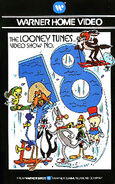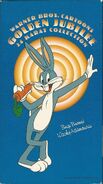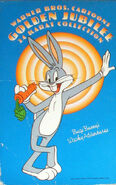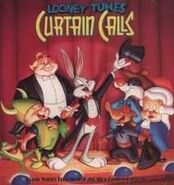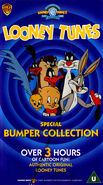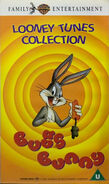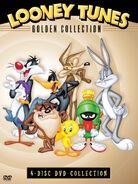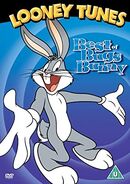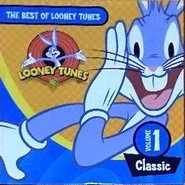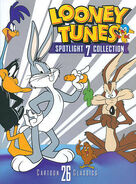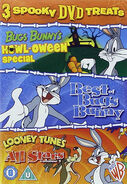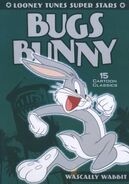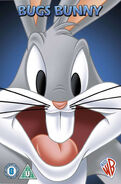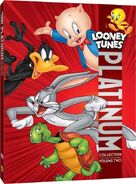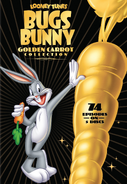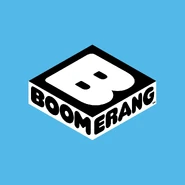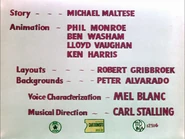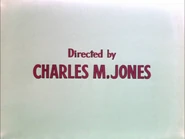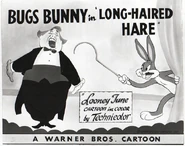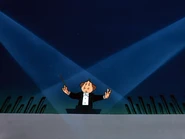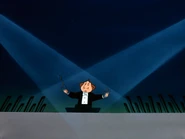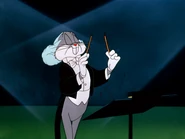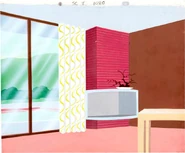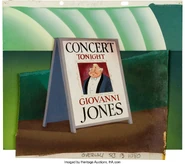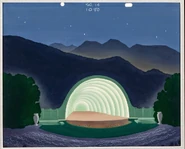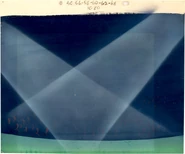Long-Haired Hare is a 1949 Looney Tunes short directed by Charles M. Jones.
Plot[]
Opera singer Giovanni Jones becomes annoyed at an as-yet-unaware Bugs for playing his banjo, harp and tuba and therefore distracting him from his singing practice. He uses the instruments as weapons to clobber Bugs. Bugs is initially tolerant of the singer's apparent rudeness, taking the first two attacks in stride; but after a third instance of such brutality, where his ears are tied to a tree branch and pulled like a slingshot, Bugs declares it's time for payback against Giovanni and declares his time-honored, Groucho Marx-inspired warning, "Of course you know, this means war!"
Bugs exacts his revenge against Jones first by hammering the roof of the "acoustically perfect" concert hall to disrupt the singer's vocals, then by spraying his throat with "alum" which shrinks his head as well his voice. Next, Bugs dresses up as an adoring teenage female fan and asks Jones for an autograph, only the pen is a stick of dynamite.
Finally, for the coup de grâce, Bugs poses as the highly respected "Leopold" to take over the conducting duties. Bugs conducts Jones through a virtuoso performance before administering the final blow: holding a singular note until Jones can hardly endure the strain. At one point, Bugs leaves his glove hovering in the air and steps outside to order a pair of ear muffs while Giovanni's face turns different colors as his tuxedo unravels under the pressure; his collar detaches, vestee bursts off, dickey rolls into face, suspenders give, and slacks fall around ankles. Bugs returns to his glove to find Jones on the floor banging his fists in what's left of his torn apart tuxedo and flowery underpants. Eventually, the concert roof comes crumbling down on top of the unfortunate singer. Bugs then takes off his earmuffs, stops conducting for a moment and bows as Jones climbs out of the rubble, he also takes a bow in shreds that were once a tuxedo. His face is beaten & bruised in purple and blue. Bugs again cues Jones to sing that same note so that a boulder, precariously balanced on a steel girder, falls on the singer's head.
Bugs removes his wig and closes out the performance by strumming the old vaudeville-era four-note tune, "Good Eve-ning Frieeeeends", on a banjo.
Caricatures[]
Music[]
The short's musical score includes original music by Carl Stalling, but a significant proportion of the score is pre-existing music, including several operatic pieces. The following pieces are used in the film:
- Gioacchino Rossini - "Largo al factotum" from The Barber of Seville - Opening titles, Giovanni Jones' rehearsal scenes and second piece at concert
- Arthur Schwartz - "A Rainy Night in Rio" - played by Bugs on a banjo
- Barney Fagan - "My Gal is a High-Born Lady" - played by Bugs on a harp (melody only). The original subject and lyrics depicting racism in this popular 1896 song were not used. Instead, Bugs' song lyrics were re-written as an enjoyable testament to his gal's dancing prowess. The author of the re-written lyrics is unverified, but possibilities include Carl Stalling or Michael Maltese.
- Herman Hupfeld - "When Yuba Plays the Rumba on the Tuba" - played by Bugs on a tuba
- Gaetano Donizetti - "Chi Mi Frena In Tal Momento" from Lucia di Lammermoor - first piece at Giovanni Jones' concert. This makes no sense, since the piece in question is a sextet, with a tenor (Edgardo) and a baritone (Enrico) making the joint first entry and four other characters to join the sextet shortly thereafter; no one else but Giovanni Jones is on stage, so how he's going to sing a sextet by himself is unclear.
- Richard Wagner - "Prelude, 2nd theme" from Act III of Lohengrin - autograph scene
- Franz von Suppé - "Overture" from Die schöne Galathee - Bugs enters in 'Leopold' disguise.
Availability[]
The Looney Tunes Video Show Volume 18
Bugs Bunny's Wacky Adventures
Bugs Bunny's Wacky Adventures
Looney Tunes Curtain Calls: Classic Music and Show Business Cartoons
Special Bumper Collection (Vol. 3)
Bugs Bunny
Looney Tunes: The Collectors Edition Volume 5: Musical Masterpieces
Bugs Bunny (2003)
Looney Tunes Golden Collection: Volume 1, Disc One (Restored without DVNR)
Looney Tunes Collection Best of Bugs Bunny
The Best of Looney Tunes (KFC) Volume 1
Looney Tunes Spotlight Collection: Volume 7, Disc 1
3 Spooky DVD Treats
Bugs Bunny
Looney Tunes Platinum Collection: Volume 2, Disc One (Restored with DVNR)
Looney Tunes Platinum Collection: Volume 2, Disc One (Restored with DVNR)
Looney Tunes Bugs Bunny Golden Carrot Collection, Disc 1
Streaming[]
Censorship[]
- When the short aired on ABC, the entire "bobby-soxer" sequence was omitted.
- On CBS, whose programming people at the time despised the cartoon due to how violent it was, the "bobby-soxer" scene was also deleted, as well as the scenes in which Jones attacked Bugs after interrupting his singing, breaking apart his banjo and smashing the remnants of it over Bugs' head, slamming the harp on Bugs' neck, and pulling Bugs out of the tuba, tying his ears to a tree branch and pulling his body back so he snaps back and his head hits the branch.[3]
Notes[]
- Giovanni Jones' singing voice remained uncredited and unknown for many years. It was since revealed to have been provided by opera singer Nicolai Shutorov. This is noted in the commentary voice-over provided on the DVD.
- Mel Blanc voices Jones when, after getting stuck in a tuba in the orchestra pit, he yells for someone to let him out.
- Giovanni Jones later appears as a minor character in The Looney Tunes Show and Looney Tunes: Rabbits Run. He also makes a cameo in Space Jam during the basketball game.
- Also noted on the DVD commentary is Bugs Bunny's conducting performance as "Leopold", as a send-up of conductor Leopold Stokowski's energetic style, including his shunning the baton. As Bugs enters the concert hall wearing a Stokowski-like hairpiece, the orchestra members begin whispering among themselves, "Leopold! Leopold!" The DVD commentator also notes that Stokowski conducted many performances at the Hollywood Bowl, where the second half of this film is set.
- An edited-for-time version was included in The Bugs Bunny Road-Runner Movie (1979). Bugs was in the middle of playing Chopin's "Minute Waltz" in under thirty seconds when introducing the short. Afterwards, he brings out a banjo like the one he used early in this short and comments how he found out here that there are some people who don't like music.
- On the Bugs Bunny's Wacky Adventures VHS, the border during the opening title cards is colored yellow.
- Disney's "Willie the Operatic Whale" sang "Largo al factotum" then "Lucia di Lammermor" three years prior to this.
- For no particular reason, the background for the color rings is black when it should be blue. This error also appeared in "The Up-Standing Sitter".
- In Daffy Duck's Quackbusters, when Egghead, an agent of the Cheapskate Savings and Loan, informs Daffy in song that he has been dispossessed, he finishes his song by singing, "Good evening, frieeeeends!", while the banjo music that plays this same ditty from this cartoon is played in the background.
Gallery[]
References[]
- ↑ https://archive.org/details/1976motionpictur3301213libr/page/86/mode/1up?view=theater
- ↑ (3 October 2022) Cartoon Voices of the Golden Age, Vol. 2 (in en). BearManor Media, page 145.
- ↑ http://www.intanibase.com/gac/looneytunes/censored-k-l.aspx
External links[]
- "Long-Haired Hare" at the SFX Resource Wiki

